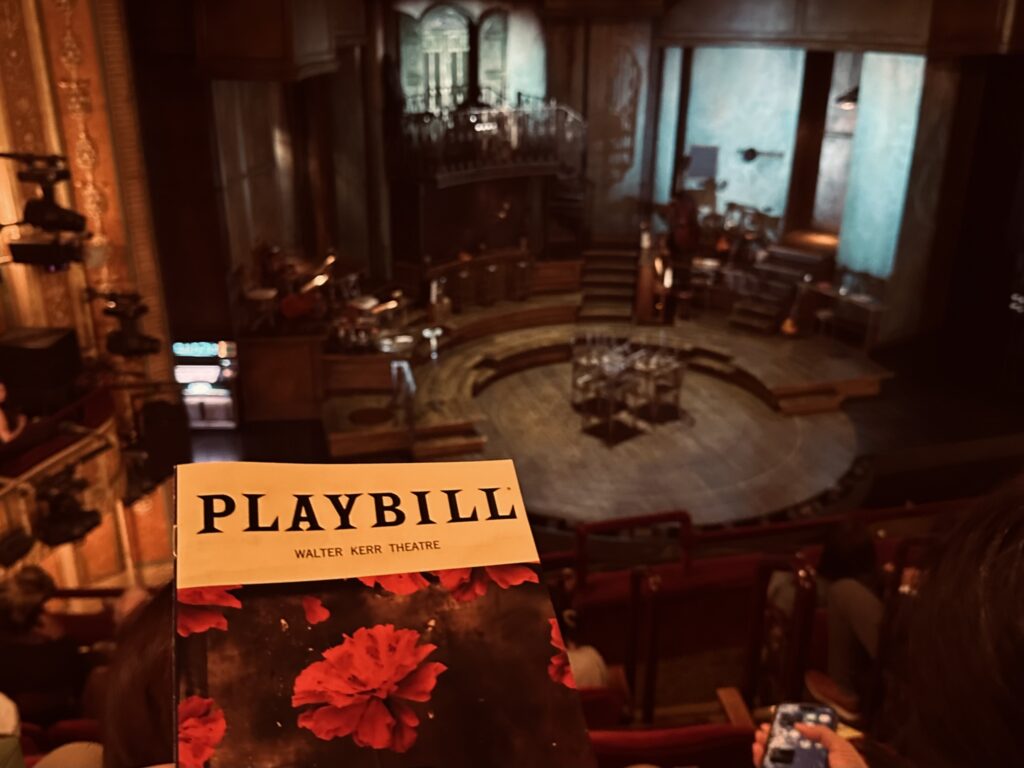Way Down Hadestown

Hi there!
Last night, I got to see Anaïs Mitchell’s Hadestown on Broadway. I knew the soundtrack before, but seeing the musical performed live brought the story to life in new ways. It was emotional, haunting, and full of moments that left me thinking long after the final note. So I thought I’d share some of my impressions with you.
For anyone unfamiliar, Hadestown retells the ancient Greek myth of Orpheus and Eurydice. Orpheus, a talented musician, loves Eurydice so deeply that when she dies, he follows her into the underworld to bring her back. His music is so beautiful that it convinces Hades, lord of the underworld, to let her return to the land of the living—on one condition: Orpheus must lead the way and trust that Eurydice is following behind him. If he turns around to check, she’ll be lost forever. Of course, as the story goes, doubt gets the better of him, and he looks back, losing her for good.
The show takes this ancient myth and makes it feel fresh and full of emotion. The music is deeply atmospheric, weaving in blues, jazz, and folk influences, and it perfectly matches the themes of love, loss, and trust that run through the story. Watching it unfold live, you can’t help but feel for Orpheus as he struggles between hope and despair, and Eurydice, who’s just trying to survive in a harsh, unforgiving world.
Hermes, a father figure and mentor to young Orpheus, summarizes his inner turmoil during the reprise of Wait for Me, which is probably my favorite moment in the show. The (absolutely beautiful!) lyrics go like this:
The meanest dog you’ll ever meet
He ain’t the hound dog in the street
He bares some teeth and tears some skin
But, brother, that’s the worst of him
The dog you really got to dread
Is the one that howls inside your head
It’s him whose howling drives men mad
And a mind to its undoing.
This stanza captures so much of Orpheus’ struggle. The true enemy isn’t Hades or even the physical journey through the underworld—it’s the doubt inside his own mind. That “dog” howling in his head represents his fears, his insecurities, the nagging sense that maybe Eurydice isn’t really following him. It’s this inner doubt that ultimately undoes him.
At the beginning of the story, Orpheus is full of hope and optimism. He sees the world not as it is, but as it could be. He’s so wrapped up in his vision of a better, more beautiful world that he becomes blind to the harsh realities that Eurydice is facing. She’s struggling to survive, hungry, and tired, but Orpheus is lost in his music, dreaming of a perfect world. It’s this idealism that leads to her death in the first place—he doesn’t see her pain until it’s too late.
As the story progresses, Orpheus changes. By the time he’s in the underworld, he’s no longer the bright-eyed dreamer. His optimism has been replaced by doubt and fear. He swings from one extreme to the other—first too hopeful, now too doubtful. And in both cases, he’s blinded. Whether by his idealism or his despair, he’s unable to see the reality of what’s happening around him.
That’s the painful lesson of the tale. An excess of optimism or pessimism can blind us to reality. Orpheus starts off so focused on the potential of what could be that he misses the difficult reality of what is. By the end, he’s consumed by doubt, unable to trust himself or Eurydice. In both cases, he’s trapped in his own head.
As an emerging writer (and human being), I can relate. Writing is so much like Orpheus’ journey—at first, you’re filled with hope and big ideas about the kind of stories you want to tell, but soon the reality of rejection, self-doubt, and fear creeps in. Sometimes, it feels like you’re constantly swinging between feeling like you’re on the verge of something amazing and thinking you’re just not good enough. But I’m learning that you need both: the hope to keep going, and the realism to ground you. It’s a balance I’m still trying to find, but watching Orpheus struggle with it on stage made me realize how important it is—not just in writing, but in life.
Hadestown was such a beautiful reminder of that balance we all need to find. You can’t live with your head in the clouds, but you can’t live in the darkness either. Somewhere between the two is where we can see clearly, trust the process, and maybe—just maybe—avoid turning around at the last moment.
Talk to you soon—
—Lara